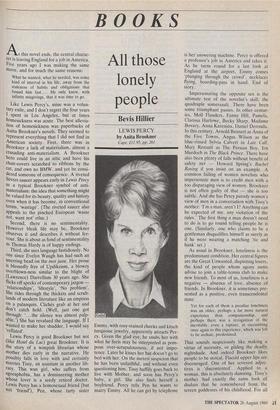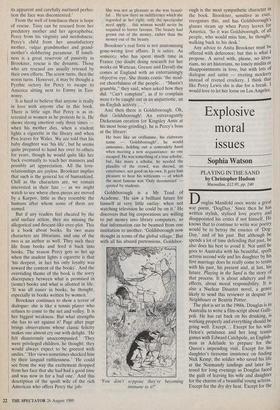BOOKS
All those lonely people
Bevis Hillier
LEWIS PERCY by Anita Brookner
Cape,111 .95, pp. 261
A. s this novel ends, the central charac- ter is leaving England for a job in America. Five years ago I was making the same move, and for much the same reasons:
What he wanted, what he needed, was some kind of interval in his life, away from the staleness of habits and obligations that bound him fast.... He only knew, with infinite misgivings, that it was time to go.
Like Lewis Percy's, mine was a volun- tary exile, and I don't regret the four years I spent in Los Angeles, but at times homesickness was acute. The best allevia- tion of homesickness was paperbacks of Anita Brookner's novels. They seemed to represent everything that I did not find in American society. First, there was in Brookner a lack of materialism, almost a crusading anti-materialism. A Brookner hero could live in an attic and have his chair-covers scratched to ribbons by the cat, and own no BMW, and yet be consi- dered someone of consequence. A riveted Sevres saucer appears early in Lewis Percy as a typical Brookner symbol of anti- materialism: the idea that something might be valued for its beauty, quality and history even when it has become, in conventional terms, 'wastage'. (The riveted saucer also appeals to the pinched European 'waste not, want not' ethic.)
Second, there is no sentimentality. However bleak life may be, Brookner Observes it and describes it without fer- vour. She is about as fond of sentimentality as Thomas Hardy is of happy endings.
Third, she uses language fastidiously. No , one since Evelyn Waugh has had such an
, Unerring bead on the mot juste. Her prose IS blessedly free of Updikeism, a blowzy overblown-ness similar to the blight of (Lawrence) Durrellism 30 years ago. She flicks off specks of contemporary jargon — relationships', 'lifestyle', 'No problem'. She rides through the thickets and scrub- lands of modern literature like an empress on a palanquin. Clichés grab at her and don't catch hold. (Well, just one got through: `... the silence was almost palp- able.') She has revalued the language. If I wanted to make her shudder, I would say 'reflated'.
_Lewis Percy is good Brookner but not (like Hotel du Lac) great Brookner. It is the story of a wimpish librarian whose mother dies early in the narrative. He Possibly falls in love with and certainly marries Tissy, an assistant in another lib- rary. This wan girl, who suffers from agoraphobia, has a domineering mother Whose lover is a seedy retired doctor. Lewis Percy has a homosexual friend (but not 'friend), Pen, whose tarty sister Emmy, with rosy-stained cheeks and kitsch turquoise jewelry, apparently attracts Per- cy. Given the glad eye, he snubs her with what he feels may be interpreted as pom- pous over-scrupulousness, if not impo- tence. Later he kisses her but doesn't go to bed with her. On the merest suspicion that he has been unfaithful, and without even questioning him, Tissy huffily goes back to live with Mother, and soon has Percy's baby, a girl. She also finds herself a boyfriend. Percy tells Pen he wants to marry Emmy. All he can get by telephone
is her answering machine. Percy is offered a professor's job in America and takes it. As he turns round for a last look at England at the airport. Emmy comes 'plunging through the crowd', necklaces flying, boarding-pass in hand. End of stbry.
Impersonating the opposite sex is the ' ultimate test of the novelist's skill, the , quadruple somersault. There have been some triumphant passes. In other centur- ies, Moll Flanders, Fanny Hill, Pamela, Clarissa Harlowe, Becky Sharp, Madame Bovary, Anna Karenina, Daniel Deronda. In this century, Arnold Bennett as Anna of the Five Towns, Angus Wilson as the blue-rinsed Sylvia Calvert in Late Call, Mary Renault as The Persian Boy, Iris Murdoch in The Black Prince. There have also been plenty of falls without benefit of safety net Howard Spring's Rachel Rosing if you insist on an example. A common failing of women novelists who impersonate men is to credit men with a too disparaging view of women. Brookner is not often guilty of that — she is too subtle. And she has Percy parody women's view of men in a conversation with Tissy's mother: 'Fm a man, aren't I? Anything can be expected of me, any violation of the rules.' The first thing a man doesn't need to do is to go round telling people he is one. (Similarly, one who claims to be a gentleman disqualifies himself as surely as if he were wearing a matching 'tie and hank' set.)
As usual in Brookner, loneliness is the predominant condition. Her central figures are the Great Unwanted, dispiriting losers, the kind of people whom agony aunts advise to join a table-tennis club to make new friends. To most of us, loneliness is a negative — absence of love, absence of friends. In Brookner, it is sometimes pre- sented as a positive, even transcendental state:
Yet for each of them a peculiar loneliness was an older, perhaps a far more natural experience than companionship, and perhaps there was a recognition of the inevitable, even a rapture, in succumbing once again to this experience, which was felt to be archaic, predestined.
That sounds suspiciously like making a virtue of necessity, or gilding the deadly nightshade. And indeed Brookner likes people to be stoical. Flaccid upper lips are discouraged. One of her severest adjec- tives is 'discontented'. Applied to a woman, this is absolutely damning. Tissy's mother 'had exactly the same look of disdain that he remembered from the screen goddesses of his childhood. For all
its apparent and carefully nurtured perfec- tion the face was discontented.'
From the well of loneliness there is hope of rescue. Tissy can be rescued from her predatory mother and her agoraphobia; Percy from his virginity and nerdishness; Percy's child from her unsatisfactory mother, vulgar grandmother and grand- mother's slobbering paramour. If loneli- ness is a great reservoir of passivity in Brookner, rescue is the dynamic. Those who are rescued are usually rescued by their own efforts. The screw turns, then the worm turns. However, it may be thought a Pyrrhic victory for Percy to escape to America sitting next to Emmy in Eco- nomy.
It is hard to believe that anyone is really in love with anyone else in this book. There is little sign that Percy is as in- terested in women as he protests he is. He shows strong emotion only three times — when his mother dies, when a student lights a cigarette in the library and when Pen leaves for Wales. We are told that his baby daughter was 'his life', but he seems quite prepared to hand her over to others for years, though he would quite like her back eventually to teach her manners and possibly art appreciation. All the love- relationships are joyless. Brookner implies that such is the general lot of humankind. Chill as the characters are, we remain interested in their fate — as we might watch to see where chess pieces are moved by a Karpov, little as they resemble the humans after whom some of them are named.
But if any readers feel cheated by the arid surface action, they are missing the allegorical and descant-like over-plot. This is a book about books. Its two main characters are librarians, and one of the two is an author as well. They slid( their life from books and feed it back into books. The reason Percy gets so het up when the student lights a cigarette is that 'his deepest, in fact his only loyalty was toward the content of the books'. And the overriding theme of the book is the sorry discrepancy between what is promised in (some) books and what is allotted in life. 'It was all easier in books, he thought, especially in books written by women.'
Brookner continues to show a terror of dialogue: she is like a tennis player who refuses to come to the net and volley. It is her biggest weakness. But what strengths she has to set against it Page after page brings observations whose classic felicity makes one almost cry out with delight. 'He felt disastrously unaccompanied.' They were privileged children, he thought; they would always expect to be greeted with smiles.' Her views sometimes shocked him by their languid ruthlessness.' He could see from the way the excitement dropped from her face that she had had a good time and was now in for a bad one.' And this description of the spoilt wife of the rich American who offers Percy the job:
She was not as pleasant as she was beauti- ful... He saw there an indifference which she regarded as her right: only the spectacular need apply... this woman would never be required to barter favours. The beauty had grown out of the money, rather than the money out of the beauty.
Brookner's real forte is not anatomising gone-wrong love affairs. It is satire. As someone who has spent much time in France (no doubt doing research for her works on Watteau, Greuze and David) she comes at England with an entertainingly objective eye. She thinks comic 'the mod- est cheerfulness of the people... "Mustn't grumble," they said, when asked how they did. "Can't complain", as if to complain were to be caught out in an unpatriotic, an un-English activity....'
And then there is Goldsborough. Oh, that Goldsborough! An extravagantly Dickensian creation (or Kingsley Amis at his most bone-grinding), he is Percy's boss at the library:
He bore like an oriflamme, his elaborate name — `Goldsborough!', he would announce, holding out a comradely hand when meeting a new acquaintance: no one escaped. He was something of a true scholar, but, like many a scholar, he needed the plaudits of the crowd, was shrewd, an entertainer, not good on his own. It gave him pleasure to hear his witticisms — of which the most famous was 'Only deconstruct' — quoted by students.
Goldsborough is a Mr Toad of Academe. 'He saw a brilliant future for himself at very little outlay: when not watching television he could be on it.' He discovers that big corporations are willing to put money into library computers, so that information can be beamed from one institution to another. `Goldsborough now thought in terms of the global village.' But with all his absurd pretensions, Goldsbor- 'You don't svppose they're becoming immune to it?' ough is the most sympathetic character in the book. Brookner, sensitive as ever, recognises this, and has Goldsborouigh's glasses steam up when Percy leaves for America. 'So it was Goldsborough, of all people, who would miss him, he thought, walking back to his desk.'
Any advice to Anita Brookner must be offered with deference; but this is what I propose. A novel with, please, no libra- rians, no art historians, no lonely misfits or disappointments in love, but with lots of dialogue and satire — riveting mockery instead of riveted crockery. I think that like Percy Lewis she is due for a break. I would love to let her loose on Los Angeles.











































 Previous page
Previous page